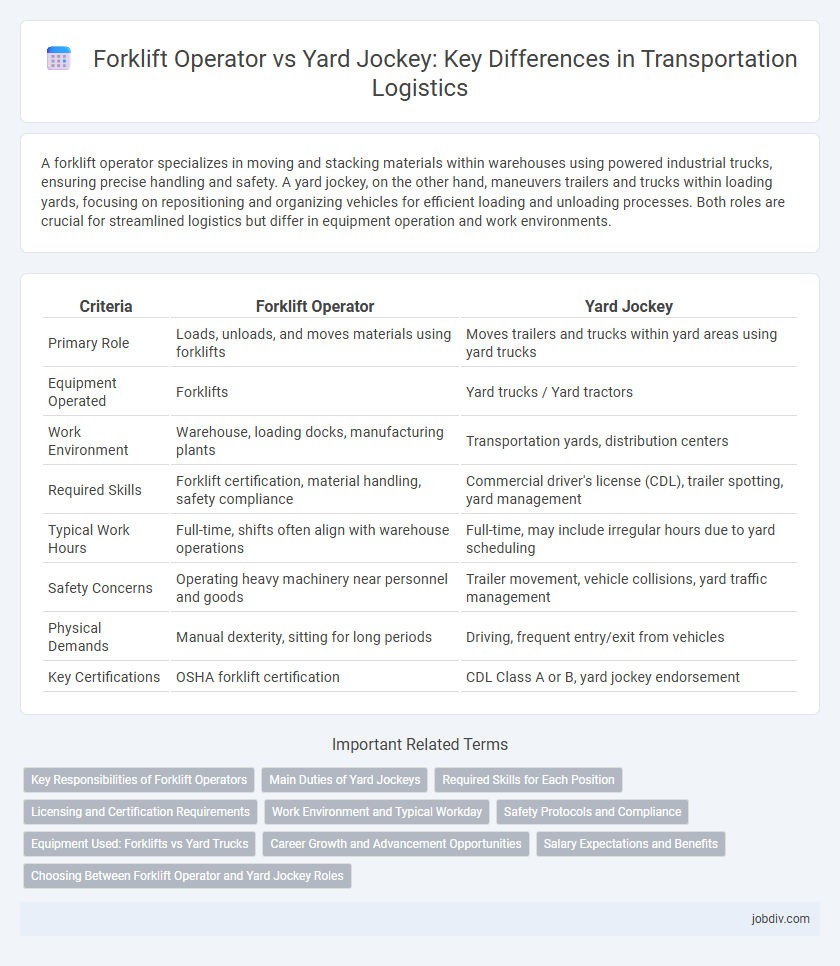A forklift operator specializes in moving and stacking materials within warehouses using powered industrial trucks, ensuring precise handling and safety. A yard jockey, on the other hand, maneuvers trailers and trucks within loading yards, focusing on repositioning and organizing vehicles for efficient loading and unloading processes. Both roles are crucial for streamlined logistics but differ in equipment operation and work environments.
Table of Comparison
| Criteria | Forklift Operator | Yard Jockey |
|---|---|---|
| Primary Role | Loads, unloads, and moves materials using forklifts | Moves trailers and trucks within yard areas using yard trucks |
| Equipment Operated | Forklifts | Yard trucks / Yard tractors |
| Work Environment | Warehouse, loading docks, manufacturing plants | Transportation yards, distribution centers |
| Required Skills | Forklift certification, material handling, safety compliance | Commercial driver's license (CDL), trailer spotting, yard management |
| Typical Work Hours | Full-time, shifts often align with warehouse operations | Full-time, may include irregular hours due to yard scheduling |
| Safety Concerns | Operating heavy machinery near personnel and goods | Trailer movement, vehicle collisions, yard traffic management |
| Physical Demands | Manual dexterity, sitting for long periods | Driving, frequent entry/exit from vehicles |
| Key Certifications | OSHA forklift certification | CDL Class A or B, yard jockey endorsement |
Key Responsibilities of Forklift Operators
Forklift operators are responsible for safely lifting, moving, and stacking heavy materials in warehouses, distribution centers, and storage yards. They handle loading and unloading trucks, inspecting forklifts for maintenance issues, and ensuring compliance with safety regulations. Unlike yard jockeys who primarily move trailers within a yard, forklift operators specialize in precise material handling using powered industrial trucks.
Main Duties of Yard Jockeys
Yard jockeys primarily manage the movement of trailers within shipping yards, ensuring efficient loading and unloading operations. They operate yard trucks to position trailers for forklift operators and warehouse staff, maintaining workflow continuity. Their duties include inspecting vehicles for safety compliance and coordinating with dispatch to optimize yard traffic and logistics.
Required Skills for Each Position
Forklift operators require proficiency in maneuvering various forklift models, precise load handling, and knowledge of safety regulations to prevent workplace accidents. Yard jockeys must excel in operating yard trucks, spatial awareness for coordinating trailer movements, and strong communication skills for efficient trailer dispatching. Both roles demand physical stamina and attention to detail but differ in vehicle operation expertise and logistical coordination.
Licensing and Certification Requirements
Forklift operators are required to obtain OSHA certification, which involves hands-on training and passing a written exam to ensure safe handling of forklifts. Yard jockeys, who primarily move trailers within a yard using specialized terminal tractors, typically need a commercial driver's license (CDL) with appropriate endorsements depending on state regulations. Both roles demand adherence to safety standards, but forklift operator certification is specifically focused on forklift equipment, whereas yard jockey licensing aligns with commercial vehicle operation.
Work Environment and Typical Workday
Forklift operators primarily work indoors in warehouses or distribution centers, handling palletized goods and loading trucks, while yard jockeys operate outdoors, maneuvering trailers and containers within large truck yards or shipping terminals. A typical workday for forklift operators involves repetitive lifting and stacking tasks under strict safety protocols, whereas yard jockeys focus on precise trailer movement and positioning, often facing variable weather conditions and high traffic areas. Both roles require familiarity with vehicle operation and safety regulations, but the yard jockey's environment demands greater spatial awareness and adaptability to outdoor settings.
Safety Protocols and Compliance
Forklift operators and yard jockeys must adhere strictly to OSHA safety protocols, including the use of personal protective equipment (PPE) and regular equipment inspections to prevent workplace accidents. Compliance with weight limits, speed regulations, and proper signaling is critical to maintaining a safe working environment in both roles. Training programs emphasize situational awareness and emergency procedures to reduce the risk of injuries and ensure full regulatory compliance.
Equipment Used: Forklifts vs Yard Trucks
Forklift operators primarily use forklifts, which are essential for lifting and moving heavy pallets and materials within warehouses or loading docks. Yard jockeys operate yard trucks, specialized vehicles designed to maneuver semi-trailers within freight yards for repositioning and staging. The distinct equipment reflects their operational roles: forklifts excel in vertical lifting and indoor handling, while yard trucks facilitate horizontal movement across large outdoor storage areas.
Career Growth and Advancement Opportunities
Forklift operators can advance by gaining certifications in specialized equipment operation and transitioning into supervisory roles within warehouse or manufacturing environments. Yard jockeys often progress by developing skills in logistics coordination and yard management, leading to positions such as yard manager or logistics supervisor. Both careers offer growth potential through experience and training, but yard jockey roles may provide broader opportunities in transportation logistics.
Salary Expectations and Benefits
Forklift operators typically earn an average annual salary of $35,000 to $45,000, with benefits including health insurance, paid time off, and overtime pay, reflecting their critical role in warehouse operations. Yard jockeys, who manage trailer movements in shipping yards, usually command higher wages ranging from $40,000 to $55,000 annually due to the specialized skill set and added responsibilities, often accompanied by hazard pay and performance bonuses. Both positions offer employer-sponsored retirement plans and job stability in logistics and supply chain industries, but yard jockeys generally have a slight edge in total compensation packages.
Choosing Between Forklift Operator and Yard Jockey Roles
Forklift operators specialize in maneuvering forklifts to lift, transport, and stack materials within warehouses or storage yards, optimizing inventory management and operational flow. Yard jockeys primarily move trailers within shipping yards, ensuring efficient dock alignment and staging for loading or unloading, critical for logistics coordination. Selecting between the two roles depends on the specific operational needs: forklift operators suit environments requiring detailed material handling, while yard jockeys excel in managing trailer positioning and yard traffic.
Forklift Operator vs Yard Jockey Infographic

 jobdiv.com
jobdiv.com